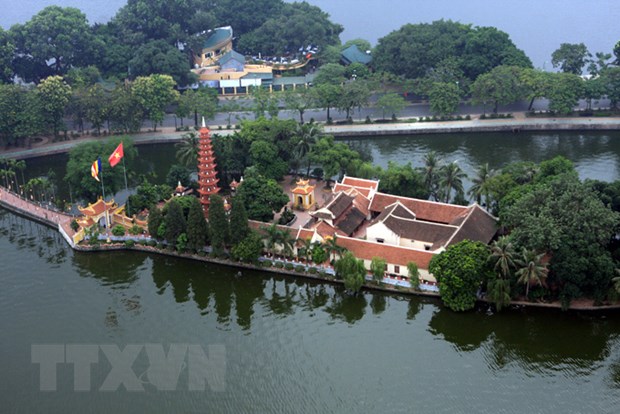Ha Noi has been emerging as a top destination for both domestic and foreign travellers in recent years, and it is still working to establish itself as a true tourist hub.

In 2016, the municipal Party Committee issued a resolution on the capital city’s tourism development which aims to make breakthroughs in the local industry to turn Ha Noi into an attractive and high-end destination.
Magnet for domestic, foreign holidaymakers
From 2016 to 2018, the number of tourist arrivals in Ha Noi grew by 10.2 percent each year. Notably, the annual growth rate of foreign visitors reached 22.5 percent.
Last year, the city welcomed 26.3 million visitors, up 10.4 percent and accounting for 27.5 percent of total tourist numbers in Viet Nam. That included more than 6 million foreigners coming to Ha Noi, equivalent to 38.7 percent of all foreign visitors to the country.
In the list of the top 100 city destinations 2018 released by Euromonitor International, Ha Noi ranked fourth among capital cities in Southeast Asia in terms of foreign tourist numbers, following Bangkok (23.69 million), Singapore (18.55 million) and Kuala Lumpur (13.43 million).
Its revenue from tourists increased from nearly 61.78 trillion VND (2.6 billion USD) in 2016 to 77.48 trillion VND in 2018, up 12.1 percent annually on average.
According to a survey conducted by municipal agencies, the average stay of foreign tourists in Ha Noi rose from 3.64 days in 2017 to 3.67 days in 2018, and that of domestic travellers from 2.12 days to 2.32 days.
A foreign traveller staying overnight in the city spent an average of 2.6 million VND (113.5 USD) a day in 2018, up almost 18 percent from the previous year. Those visiting Ha Noi for one day spent some 2.1 million VND each, up nearly 13 percent.
The respective figures of Vietnamese visitors were 1.75 million VND, up 3.2 percent, and 1.4 million VND, up 27 percent.
Statistics released by Mastercard in September 2018 showed that spending by a foreign traveller was 124 USD in Kuala Lumpur, 154 USD in Tokyo, 173 USD in Bangkok and 181 USD in Seoul.
The municipal Department of Tourism said although foreign tourists’ spending in Ha Noi is still lower than in other cities, it is nearing the figures in big tourism cities in the region and the world.
Data indicated that tourism’s contribution to Hanoi’s gross regional domestic product has been rising, reaching 8.07 percent in 2017 and 10.15 percent in 2018.
Efforts to further tap into tourism potential
To bolster tourism, Ha Noi considers improving the quality of destinations and developing infrastructure and tourism products as important tasks.
The capital plans to attract investment to build shopping centres and accelerate major projects like the Kim Quy cultural, tourism and entertainment park in Dong Anh district, the horse racing and entertainment complex in Soc Son district, and the Ha Noi Museum. It will also boost preservation projects at the Imperial Citadel of Thang Long, Bat Trang pottery village and Van Phuc silk village.
Efforts are also being made to develop 20 – 30 high-quality tourist sites across the city. Additionally, the values of local cultural heritages and traditional villages will be brought into play to turn them into attractive places of interest.
Hanoi will also augment preparations for upcoming big sports events such as Formula One racing and the 31st Southeast Asian Games to attract visitors.
Additionally, it will also make use of local culinary culture and promote MICE tourism as well as tourism products based on the strengths of its localities.
The Vietnamese capital is also working to develop high-end accommodation facilities.
Director of the Tourism Department Tran Duc Hai said the municipal People’s Committee has approved in principle 75 high-end accommodation projects with nearly 20,000 rooms. As of June this year, there were 3,499 accommodation establishments with 60,812 rooms in the city, including 67 hotels rated three to five stars with 10,004 rooms and seven condotel complexes rated four to five stars with 1,349 rooms.
Cooperation in tourism development is also a key task of the sector, he said, noting that his department is carrying out the promotion cooperation programme for 2019-2024 with TV channel CNN International.
It will also take part in meetings of the Council for Promotion of Tourism in Asia and cooperation activities of the Tourism Promotion Organisation for Asian-Pacific Cities.
Coordination with airlines, domestic and foreign media, embassies, international organisations and travel companies will also be strengthened to hold trips for businesses and reporters from key markets, according to the Tourism Department.
Hanoi aims to welcome 30 million tourist arrivals, including 5.7 million foreigners, in 2020, and attain annual growth of 8 – 10 percent in the sector. Its revenue from tourists is expected to reach 120 trillion VND in 2020 and grow by 15 – 17 percent year on year.